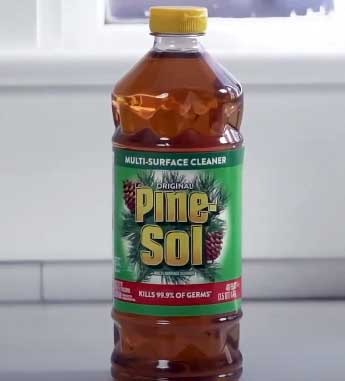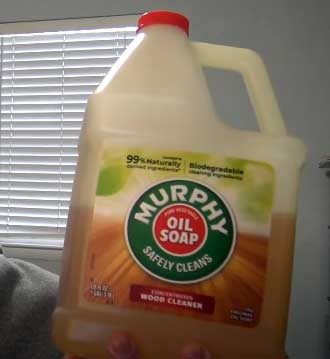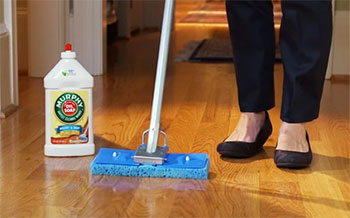Every homeowner knows the significance of keeping a clean, fresh-smelling bathroom. It’s a daunting task, but thanks to cleaning solutions like Pine-Sol and Murphy’s Oil Soap, we can achieve it with relative ease.
This review dissects these two heavyweights of cleanliness in terms of their performance and impact, helping you choose the right cleaning agent for your bathroom needs.
A Brief Comparison Table
| Aspects | Pine-Sol | Murphy’s Oil Soap |
| Formulation | Synthetic with a pine scent | Natural, primarily vegetable oil-based |
| Cleaning Efficiency | High, with strong disinfectant properties | Mild, best for cleaning wood without damaging it |
| Scent | Strong, pine-like | Mild, almost unnoticeable |
| Environmental Impact | Synthetic composition, not biodegradable | Biodegradable, free from harsh chemicals |
| Safe for Wood? | Not suitable for unsealed, waxed, oiled, or bleached wood | Ideal for most wood surfaces but not for unsealed or unvarnished wood |
| Main Use | Broad-spectrum cleaning, particularly for bathroom and kitchen | Primarily for cleaning and maintaining wooden surfaces |
Understanding the Basics: Pine-Sol and Murphy’s Oil Soap

Before jumping into the comparative review, let’s set the stage with an understanding of the two contenders.
Pine-Sol is a well-known, versatile cleaning agent famous for its disinfectant properties.
It packs a strong pine aroma and boasts the capability to tackle tough stains and grime effectively.
On the other hand, Murphy’s Oil Soap is a staple for those who value natural ingredients.
As a mild cleaner primarily made of vegetable oil, it’s ideal for cleaning wooden surfaces without risking damage.
The Strengths and Limitations of Pine-Sol
Pros
- Strong disinfecting ability – Pine-Sol contains cleaning agents and disinfectants that kill 99.9% of germs, bacteria, and viruses on hard surfaces. This makes it a great disinfecting cleaner for sanitizing bathroom germ hot spots.
- Cuts through grease, grime, and stains – The powerful degreasing agents in Pine-Sol easily break down oils, grease, soap scum, and other sticky grimy buildup you often find in bathrooms. It also removes tough stains.
- Leaves a pine fresh scent – Many people enjoy the strong pine scent Pine-Sol leaves behind after cleaning. It helps combat odors and leaves your bathroom smelling clean.
- Inexpensive and readily available – Pine-Sol is an affordable, accessible cleaning staple found at most grocery stores and big box retailers. This makes it a budget-friendly bathroom cleaning solution.
Cons
- Can be harsh on some surfaces – The strong chemicals in Pine-Sol that cut through grime can also damage more delicate surfaces like natural stone tiles or acrylic sinks if left on too long. Always rinse surfaces after cleaning.
- Lingering chemical odor – Some find the aromatic pine scent overpowering or are sensitive to strong chemical odors in general. The smell can linger long after cleaning.
- Safety concerns – Pine-Sol contains chemicals like pine oil, isopropanol, and ethanol that may cause eye, skin, and respiratory irritation and other health issues when inhaled or exposed over time.
- Not specifically formulated for bathrooms – Although it works well on bathroom messes, Pine-Sol is a general all-purpose cleaner not specially designed for bathroom cleaning.
Pros and Cons of Murphy’s Oil Soap
Pros

- All-natural plant-based formula – Murphy’s Oil Soap contains only plant-derived essential oils, vegetable oils, and other natural ingredients. This makes it a good non-toxic option if you want to avoid harsh chemicals.
- Gentle on surfaces – The soap-based Murphy’s Oil Soap won’t corrode or eat away at surfaces the way harsh chemical cleaners can over time. It’s safe for use on tile, finished wood, linoleum, and more.
- Pleasant light scent – Murphy’s Oil Soap has a subtle orange and lemon scent from natural essential oils. Users find it light and pleasant smelling.
- Leaves a clean shine – In addition to cleaning, Murphy’s Oil Soap leaves a shiny, polished look on surfaces like wood, tile, and sinks without leaving behind a chemical residue.
Cons
- Less cleaning power – While it helps lift away dirt and grime, the plant-based formula doesn’t have the strong degreasing and disinfecting abilities of chemical cleaners like Pine-Sol.
- Need to rinse thoroughly – Due to its soap-based formula, Murphy’s Oil Soap can leave behind a sticky residue if you don’t rinse surfaces thoroughly after cleaning.
- Not a disinfectant – Murphy’s Oil Soap does not disinfect or sanitize surfaces. It cleans but does not kill germs and bacteria like Pine-Sol does.
- Potential for buildup – Repeated use without rinsing can lead to a waxy buildup of the oils in the soap on surfaces over time.
Pine-Sol Vs. Murphy’s Oil Soap for Cleaning Bathroom Surfaces
Floors
On bathroom floors like tile, linoleum, and sealed hardwood, Pine-Sol is the better choice for cleaning and disinfecting. Its strong formula cuts through dirt, grime, and stains that build up while also killing germs and bacteria. Murphy’s Oil Soap can leave floors feeling sticky.
Sinks
For cleaning bathroom sinks, Pine-Sol again is the better disinfectant. It removes water spots, toothpaste gunk, soap scum buildup, and bacteria. Murphy’s Oil Soap leaves a nice shine but doesn’t sanitize. Be sure to rinse sinks well after cleaning with either product.
Showers and Tubs

To make shower and tub walls spotless, Pine-Sol is the top choice. Let it soak on soap scum and mildew stains before scrubbing.
For cleaning fiberglass tub and shower units, Murphy’s Oil Soap is safer as the chemicals in Pine-Sol can damage the finish over time.
Toilets
For toilets, Pine-Sol’s disinfecting formula kills germs, bacteria, and viruses other cleaners leave behind. Use Murphy’s Oil Soap only for spot cleaning the toilet’s exterior surfaces to avoid buildup in the bowl’s inner mechanisms.
Tiles
For sanitizing and stain removal on bathroom tiles, Pine-Sol is the best bet. Rinse immediately after to avoid any damage to grout or natural stone. Murphy’s Oil Soap is a good maintenance option for tiles in between deeper cleans.
Chrome and Metal
On metal surfaces like faucets, shower heads, and mirrors, Murphy’s Oil Soap helps leave a shine. But Pine-Sol disinfects better. Rinse thoroughly after using Pine-Sol to prevent corrosion of metal parts.
Key Differences Between Pine-Sol and Murphy’s Oil Soap
While Pine-Sol and Murphy’s Oil Soap both function as cleaning agents, they differ in several key aspects, each catering to specific needs and preferences.
Here are the primary differences between these two household cleaners.
- Formulation
The most significant distinction lies in their formulation. Pine-Sol is a potent, synthetic cleaner with a characteristic pine scent. It has strong disinfectant properties, making it an excellent choice for dealing with bacteria and germs.
On the other hand, Murphy’s Oil Soap prides itself on its gentle, natural formula. It’s primarily vegetable oil-based, making it a safer bet for sensitive materials like wood. Moreover, it’s free from harsh chemicals and is biodegradable.
- Cleaning Efficiency
Pine-Sol is a heavy-duty cleaner that efficiently tackles stubborn stains, dirt, grime, and even mildew. Its broad-spectrum cleaning and disinfecting abilities make it ideal for bathrooms and other areas that require deep cleaning. Watch for yourself how you can do it yourself.
Murphy’s Oil Soap is a milder cleaner, ideal for cleaning and preserving wooden surfaces without stripping their natural oils. However, it doesn’t match Pine-Sol’s capability in terms of overall cleaning efficiency and disinfection.
- Scent
The scent of a cleaning product significantly influences user experience. Pine-Sol’s strong, pine-like fragrance can be invigorating for some but overwhelming for others.
Murphy’s Oil Soap, conversely, has a much milder, almost unnoticeable scent, making it a preferable choice for those sensitive to strong fragrances.
- Environmental Impact
If eco-friendliness is your priority, Murphy’s Oil Soap gets the upper hand. It’s biodegradable and free from harsh chemicals, presenting a more environmentally friendly cleaning option.
Pine-Sol, while efficient, doesn’t score as high in this department due to its synthetic composition.
- Safety on Different Surfaces

Pine-Sol’s potency can be a downside for delicate surfaces. It’s not suitable for use on unsealed, waxed, oiled, or bleached wooden surfaces as it can damage them.
Murphy’s Oil Soap, with its gentler formulation, is safer for wooden surfaces but not recommended for unsealed or unvarnished wood, marble, or aluminum.
The choice between Pine-Sol and Murphy’s Oil Soap for bathroom cleaning depends on your specific needs. If you have wooden cabinets or fixtures in your bathroom, Murphy’s Oil Soap is your go-to for safe and effective cleaning.
However, for a robust deep-clean that tackles germs, Pine-Sol is a stronger option.
Frequently Asked Questions (FAQ)
Murphy’s Oil Soap is not suitable for unsealed or unvarnished wood, as it can penetrate the wood and darken it. It’s also not recommended for non-wood surfaces like marble and aluminum.
Avoid using Pine-Sol on unsealed, waxed, oiled, or bleached wooden surfaces. Pine-Sol’s strong formulation can damage these materials.
While Murphy’s Oil Soap can be used without rinsing off, it’s recommended to do so for the best results. This is especially true when used on surfaces that come into direct contact with food.
Murphy’s Oil Soap is primarily used for cleaning wooden surfaces. Its gentle formula protects the natural oils in the wood while removing dirt and grime.
Yes, Murphy’s Oil Soap is safe for cleaning non-acidic glazed ceramic, porcelain, and quarry bathroom tiles. It helps lift away grimy buildup without damaging the tile or grout when rinsed thoroughly. Use weekly or monthly for maintenance cleaning.
You can use Murphy’s Oil Soap to spot clean the outside porcelain toilet bowl surfaces as well as the toilet seat, rim, and tank. However, it is not a disinfectant so it won’t sanitize the interior toilet bowl surfaces. Use a disinfecting cleaner like Pine-Sol for the inside of the toilet.
Wrapping Up
In conclusion, both Pine-Sol and Murphy’s Oil Soap offer unique advantages in bathroom cleaning. The choice between the two boils down to your specific cleaning requirements and the type of surfaces you have in your bathroom.
Use this detailed review as a guide to making the best decision for your cleaning needs. Remember, a clean bathroom is a happy bathroom!
